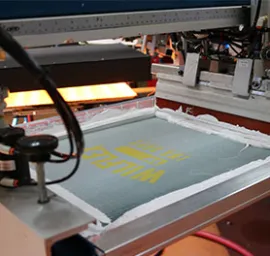Transfer Troubleshooting
To enhance the stretch and durability for screen printed transfers that will apply to garments, add 15 percent (by weight) of a small-adhesive particle powder to the ink. Mix completely into the transfer ink and print through an 86 th/in (34 th/cm) screen mesh.
Improving Opacity of a Transfer
1. Increase ink deposit. Ink deposit too thin.
2. Color not opaque. Reformulate as high opaque color.
3. Ink over-gelled. Reduce time and/or temperature.
4. Reduce time, temperature and pressure on heat press.
Decreasing Ink Penetration with Transfer Ink
- Reduce application time on press. Too much application time and temperature.
- Body up the ink with Epic Thickener #2. Ink viscosity too low.
- Substrate is very thin. Try a heavier weight garment.
Poor Adhesion of Transfer to Garment
1. Ink over-gelled on paper.
2. Increase pressure on transfer press.
3. Increase heat and time on transfer press. Application time/temp too low.
4. Weave of substrate too tight for transfer to grip garment.
5. Adhesion problem with synthetic weave.
6. Use Transflex Adhesive 10210TFX Epic Printable Adhesive to improve adhesion.
7. Check paper type to ensure compatibility.
8. High moisture content in transfer release paper.
Poor Adhesion to One or More Edges
1. Transfer too large for transfer press. Uneven heat and pressure.
2. Image too close to edge.
3. Pressure is marginal. Increase pressure.
4. Ink too thick at edge.
5. Delay few seconds before peeling.
6. Check paper type for compatibility.
Cobwebbing and Stringing
1. Inadequate ink flow. Reduce ink with Epic Viscosity Buster 10025PFX.
2. Delay before peeling.
3. Image edges are saw-toothed.
4. Application time, temp., pressure low.
Improve Harsh hand
1. Ink deposit too thick.
2. Poor stencil quality. Ensure an even and precision screen edge.
3. Ink too thick when printing. Shear down viscosity with Epic Viscosity Buster.
Poor Trapping of Colors
1. Keyline deposit too thin.
2. Squeegee edge too sharp.
3. Squeegee durometer too high.
Blurring Secondary Colors
1. No space between colors.
2. Printing on contact.
3. Printing on soft surface.
4. Squeegee pressure too high.
5. Ink deposit too heavy.
Uneven or Partial Split
1. Low pressure on transfer press.
2. Remove moisture from fabric.
3. Cool spot on platen.
4. No ink flow. Shear down viscosity with Epic Viscosity Buster.
5. Marginal overcure.
6. Delay before peeling.
7. Check paper type.
Poor Shelf Life of Printed Transfers
1. Check with paper manufacturer for recommended shelf life and storage.
2. Paper absorbing plasticizer. Try different coated transfer paper.
3. Confirm that the transfer was not over or under gelled.
4. Transfers stored in extreme temps.
Subsequent Prints Improve
1. Pre-heat transfer press.
Poor Registration
1. Paper not pre-shrunk. Try pre-shrinking @ 260°F/132°C.
2. Reduce off contact.
3. Changed grain direction of paper.
4. Varying gel temperatures. Check air flow in dryer.
5. Humidity change in stock paper. Keep paper wrapped until ready to use.
Transfer Does Not Hold Detail
1. Mesh too coarse. Remake screens with higher mesh count.
2. Stencil low quality. Good edge definition on stencil is necessary.
3. Excess squeegee pressure.
4. Ink too fluid. Body up ink viscosity with Wilflex Thickener.
5. Paper movement.
6. Inadequate off-contact.
